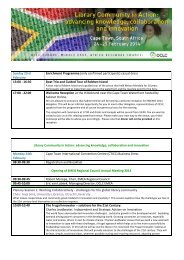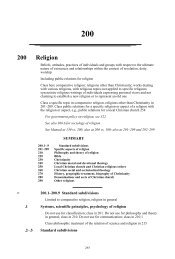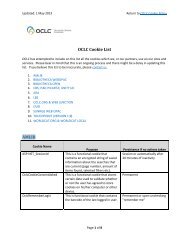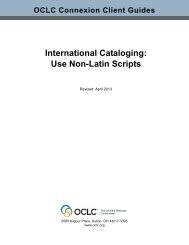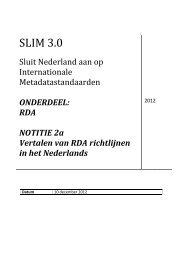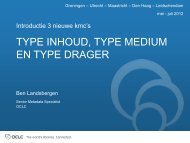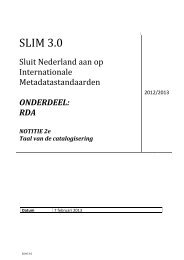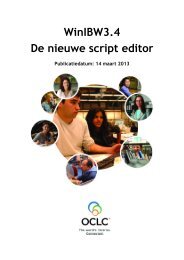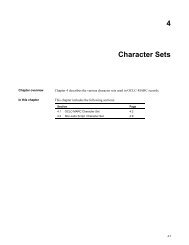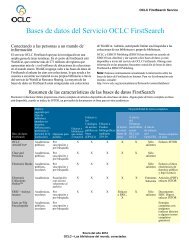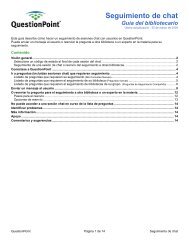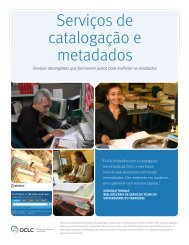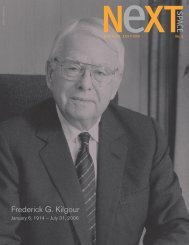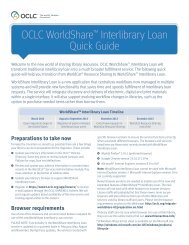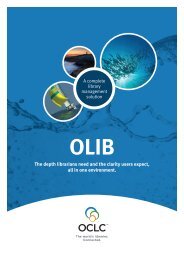Dewey Decimal Classification - OCLC
Dewey Decimal Classification - OCLC
Dewey Decimal Classification - OCLC
Create successful ePaper yourself
Turn your PDF publications into a flip-book with our unique Google optimized e-Paper software.
with <strong>Dewey</strong> numbers plus captions in Spanish and<br />
English accompanied by QR codes leading mobile<br />
devices directly into the library’s OPAC. In the<br />
near future, we plan to add Table 2 data, linked to<br />
geocodes and FAST geographic headings, to dewey.<br />
info under the same CC license.<br />
New Editorial Support System (ESS)<br />
The fourth-generation <strong>Dewey</strong> Editorial Support<br />
System (ESS) was introduced recently. The new ESS<br />
supports the development and maintenance of the<br />
DDC, “anytime” export of the DDC in a variety of<br />
formats to support a variety of services, publication<br />
of print editions, ingestion of mapped data and<br />
eventual ingestion of translation data. The system<br />
was developed by <strong>OCLC</strong> staff in Dublin, Ohio, and San<br />
Mateo, California.<br />
Earlier generations of the system used a proprietary<br />
format for data representation. The new ESS uses the<br />
MARC 21 Format for <strong>Classification</strong> Data for schedule,<br />
table and Manual data; and the MARC 21 Format for<br />
Authority Data for the Relative Index and mapped<br />
headings. As part of our move to the new system, we<br />
have switched our distribution format from the ESS<br />
XML format to a MARCXML format.<br />
Pansoft has developed the print server for the new<br />
ESS under an agreement with <strong>OCLC</strong>. As part of that<br />
agreement, Pansoft is currently converting the existing<br />
translation files supported by Pansoft to the new<br />
format.<br />
<strong>Decimal</strong> <strong>Classification</strong> Editorial Policy<br />
Committee (EPC)<br />
Meeting 133 of the <strong>Decimal</strong> <strong>Classification</strong> Editorial<br />
Policy Committee (EPC) was held June 16–18 at <strong>OCLC</strong><br />
headquarters in Dublin, Ohio. This was the last faceto-face<br />
meeting of EPC during calendar year 2010.<br />
EPC scheduled two electronic meetings, 133A and<br />
133B, to be held during the period July–August 2010.<br />
Meeting 134, the next face-to-face meeting of the<br />
committee, will be held at <strong>OCLC</strong> in mid-June 2011.<br />
In Table 1 (Standard Subdivisions), EPC approved<br />
a proposal to revise the three internal add tables in<br />
light of the updated policy on standard subdivisions<br />
with extended or narrowed meanings, and displaced<br />
standard subdivisions (the policy itself was discussed<br />
at Meeting 132 and approved at Meeting 132A). EPC<br />
also reviewed and approved changes arising from<br />
application of the aforementioned policy in Table 3<br />
(Subdivisions for the Arts, for Individual Literatures,<br />
for Specific Literary Forms); 368 Insurance; and 380<br />
Commerce, Communications, Transportation. EPC<br />
discussed updates to the add tables in 398 Folklore<br />
and 900 History, geography, and related disciplines<br />
but delayed action on them until Meeting 133A (here<br />
and elsewhere, postponement of action to Meeting<br />
133A was planned before the meeting).<br />
In Table 2 (Geographic Areas, Historical Periods,<br />
Persons), EPC approved the developments for<br />
Switzerland and Sweden, plus the name change of<br />
North-West Frontier Province to Khyber-Pakhtunkhwa<br />
in Pakistan. EPC reviewed the updates to Germany<br />
and neighboring countries and to Turkey in the<br />
ancient and modern world, but delayed final action<br />
until Meeting 133A. In Table 5 (Ethnic and National<br />
Groups) and Table 6 (Languages), EPC approved<br />
updated provisions for Finnic and Saami peoples and<br />
languages. The interoperable expansion for Finnic<br />
peoples and languages prepared for inclusion in the<br />
Norwegian and Swedish translations sparked a lively<br />
discussion about the role of the English-language<br />
print edition in setting the notational framework for<br />
the standard version of the DDC. EPC will explore this<br />
topic in depth at Meeting 134.<br />
EPC approved selected updates in the following<br />
schedules: 004-006 Computer science; 281<br />
Eastern churches (and changes related to Orthodox<br />
Christianity elsewhere in 200 Religion); 364.1<br />
Criminal offenses for terrorism; 640 Home and family<br />
management; 796 Athletic and outdoor sports and<br />
games; and 900 History, geography, and related<br />
disciplines. In the last, EPC approved changes to the<br />
history of the ancient world; the history of Sweden;<br />
and wars in Iraq, Afghanistan and Lebanon. EPC also<br />
discussed updates to the histories of Indonesia and<br />
Africa, and to countries whose historical periods are<br />
represented by decades; final action was delayed<br />
until Meeting 133A.<br />
EPC discussed the following schedules, but delayed<br />
action on them until Meeting 133A: 340 Law; 370<br />
Education; 390 Customs, etiquette, folklore; and 660<br />
Chemical engineering and related technologies. The<br />
full versions of Table 2 (Geographic Areas, Historical<br />
Periods, Persons); 800 Literature; and 900 History,<br />
geography, and related disciplines will be considered<br />
at Meeting 133A.<br />
Several discussion papers were considered by<br />
the committee. In addition to ones informing the<br />
proposed developments in 340 Law and 370<br />
Education, the committee considered a proposed<br />
update to historical periods and Hadith in 297 Islam,<br />
Babism, Bahai Faith. We plan to introduce a full



